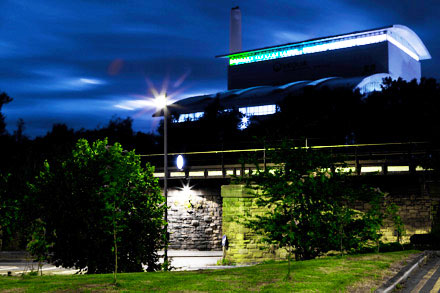Veolia resubmits Sheffield planning permission

Waste management company Veolia, has submitted new planning permission to extend the amount of residual waste its Sheffield incinerator can burn from outside of its current catchment area.
The 225,000 tonne Bernard Road plant currently has permission to burn up to 50,000 tonnes of waste from outside the Sheffield waste disposal area, but due to Sheffield’s ‘successful approach to waste management’ and increasing levels of recycling (2011/12 saw the amount of waste sent for recycling, composting or reuse overtake the amount sent to landfill for the first time ever), the plant is having to bring in more waste to run at optimal capacity levels.
This could be further compounded when the city finalises its introduction of alternative weekly collections for residual waste.
Writing in its planning applications, Veolia says: ‘[C]ircumstances relating to the generation of municipal waste, successful recycling initiatives and overall a progression in waste management practices within the City of Sheffield have led to a shift in the way waste arisings within the local area can be most sustainably managed.
‘The successful approach to waste management in the City and removal of municipal imports from areas where new contracts will now see a diversion away from the facility has resulted in the facility having to rely upon an increasing proportion of trade waste otherwise known as Commercial and Industrial (C&I) wastes derived from the same catchment area… It is now considered unlikely that sufficient Municipal Solid Waste (MSW) and C&I waste will be available to the ERF under the terms of the current planning permission… and as such the efficiency of the Plant and its associated District Energy system will not perform to its optimal level.’
Nigel Williams Veolia’s Director of Environmental Services in Sheffield said: "The planning application will not lead to any physical changes at the energy recovery facility or any increase to the existing capacity.
“Facilities such as the one we have here in Sheffield recovers [sic] energy from waste that would otherwise be lost by going to landfill. The plant is pivotal to the city’s low-carbon strategy and it is vital that it operates at optimum efficiency.”
Future trends
This could mark the beginning of many more incidents in the EfW sector, as recycling rates rise and the UK increasingly relies on EfW plants to treat residual waste.
A recent report from Eunomia Research & Consulting warned that the UK could see overcapacity in residual waste treatment plants by 2015, if the current rate of construction is not curbed. The report suggested that due to increased emphasis on recycling, reusing and recovering material, residual waste rates are falling, leaving incinerators without the required levels of waste needed to produce efficient and cost-effective processes.
Speaking at the recent LARAC conference, Vanya Veras, Secretary General of Municipal Waste Europe warned council against over-investing in incineration and following the lead of the so-called ‘good recyclers’ of Europe.
“They’ve built so many incinerators that they have overcapacity and have to feed these giants”, Veras warned, adding that in Belgium, where she’s recently moved, they’ve stopped collecting many types of packaging and have no room to increase recycling as the incinerators must be fed high levels of waste to run efficiently (and even when they run ‘efficiently’, electrical efficiencies of mass-burn incinerators range only between 15 and 25 per cent, according to consultancy AEA).
“Countries who haven’t gone down the incinerator route have better opportunities to make the most of resources”, Veras concluded.
Writing on the Isonomia blog, waste consultant Phillip Ward suggested that recycling has recently stalled in the UK in part because of increased use of EfW: 'The 11.5 megatonne (Mt) of waste that was recycled are estimated to have reduced CO2 emissions by nearly 7Mt, while the 5Mt of residual waste that was sent for EfW led to additional emissions of 2.5Mt.
'If these numbers are right and we do eventually get to a 50:50 post landfill split then EfW emissions of 7Mt will almost balance the recycling savings of 8Mt: yet another reason for us to set more ambitious recycling targets.'
A decision on Veolia’s extended planning application is expected to be announced in spring 2013.





